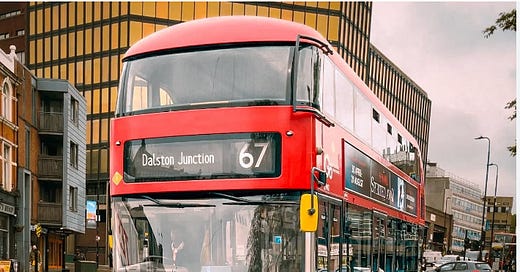This is part of a collection of nonfiction entitled “I See You”, about people whose experiences live in the shadows. The collection includes When A Street Is A House and Delivery.
A woman in a wheelchair got onto the bus after Dee and I had sat down near the disabled access area. We were lucky to get seats. The 67 was packed on this humid summer afternoon, filled with shoppers with carrier bags stuffed to the brim, grumpy looking older men and harried mothers trying to rein in school-aged children on their summer break. As usual on London transport, no one was paying attention to anyone else, but looking straight ahead in hopeful anonymity.
When the woman, pink-haired and in summer festival style pants and tie-dyed t-shirt, couldn’t get her wheelchair around a man blocking the aisle, she asked him politely if he could move.
“I’m on the phone,” he said loudly, and continued his conversation while more passengers got on the bus.
“Please, I can’t get into that space,” she said, indicating the area reserved for wheelchairs.
“I’m on the phone,” he said again, bristling with irritation while other passengers brushed past him on the other side.
The woman reddened slightly. “I can’t get my chair in the space, I need more room.”
“Go around me,” he said, shooting her a dirty look. “You can get in there.”
He ignored Dee and I calling out, “Let her pass!” while the woman kept trying to maneuver around him.
Suddenly, still with his phone to his ear, he strode angrily off the bus.
The woman was finally able to get into the space. A tall, bulky man, also in bright festival clothing, gave her a resigned look as he tried to edge in beside her.
Dee stood up. “Would you like to sit down?” she said to him.
“Yes.” He sighed in relief. “Thank you.”
Just then a passenger in his fifties standing at the front of the bus called loudly, “That man with you, he's not disabled. What do you mean you're giving him your seat? I'm disabled. Why did you give up your seat to him?”
“I am disabled,” the woman’s friend said.
“Would you like to sit down?” I called to the man up front.
“No,” he said irately. “I don't want to sit down.” He pulled out a red and white card from his wallet and waved it around. “I’m disabled.” He went on more vociferously. “Look at him. He's not disabled. She is. I know.”
Dee and I called out in unison, “You can't always tell when someone's disabled.”
“Oh my god,” I said to the woman and her friend as the man kept up his tirade. “Is this what you have to deal with?”
“Yeah, “ she said. “We do a lot.” Her voice was just as mild as before. “The bus driver didn't want me to get onto the bus. He didn't even want to lower the step.”
Her friend joined in, “This happens all the time.”
The man at the front of the bus, seeing us talking to each other, started yelling again. “He didn’t even pay his fare. Now he's saying he's disabled. I’m disabled! And you gave him your seat.”
Dee rolled her eyes and turned away. But I said, pretending to be concerned, “Would you like to sit down?” hoping that would stop his ranting.
“You seem like a reasonable person,” he said to me in a more measured voice. “He’s not disabled.”
“Look,” I said, calmly. “You know, you can't always tell when somebody's disabled. I wouldn’t know you were either.”
But the man only kept up his griping, he just wouldn't stop.
I turned to the woman and her friend. “Do you write? Because if you're dealing with this all the time, what about if you write an opinion piece to the newspaper? Or a letter. Because people really need to know.”
They looked at me, bemused. “This goes on all the time.”
I said, “It’s, like, there but for the grace of god, go I. People, they don't understand unless they've been through it.”
I could feel the woman’s friend stiffening at the mention of god, not sure if it was because I’d referred to religion, or because it could have sounded patronizing. But the woman nodded. “Yeah, we know.”
“Is there a shuttle, some kind of special transportation so you can avoid all this?”
“Yes,” her friend said, “but you have to plan in advance, we just wanted to take a spontaneous trip.”
“Oh my god. And you're not allowed to be spontaneous, bloody hell. You really handle this well.”
I didn’t realize how well until they got off the bus and I saw pinned to the back of the woman’s wheelchair, “I need fucking room.”





I really love your writing and the journey it takes me on. Sometimes pretty and other times difficult, but it always takes me somewhere I need to go. Where has our empathy gone? I guess it’s too easy to blame Trump and Covid. Maybe Thatcher?
Oh my goodness, what a story! And so brilliantly told. I laughed at the end about the sign on her back. The intricacies of human relationships are all here - even on a bus in London we can't seem to get along! Yikes. I love the support you gave. I hope she writes to the newspaper. You did a great thing in getting her story down here - it's really important.